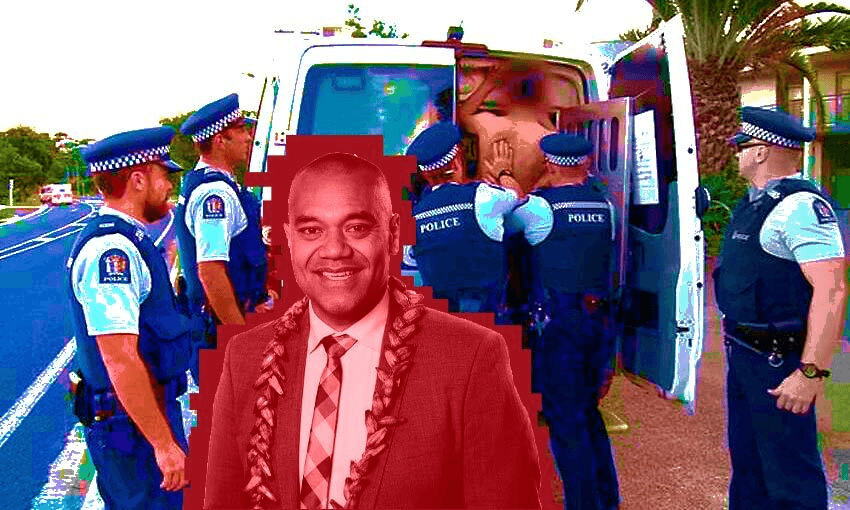Following an independent review into Police Ten 7, TVNZ has confirmed the format of the series will change. Justin Latif asked the Auckland councillor whose tweet sparked the report if he’s satisfied with its findings.
On a Sunday morning in March, Auckland councillor Fa’anana Efeso Collins was chatting with his wife about what they had seen on television that week and the topic of racial stereotyping on the reality TV series Police Ten 7 came up. Following that discussion, he tweeted his thoughts, writing that it was “low level chewing gum TV that feeds on racial stereotypes”.
Hey @TVNZ it’s time u dropped Police Ten 7. A couple of days ago I was watching tv & your ad cut promo’ing the program showed young brown ppl. This stuff is low level chewing gum tv that feeds on racial stereotypes & it’s time u acted as a responsible broadcaster & cut it.
— Efeso Collins (@efesocollins) March 20, 2021
The tweet attracted a flurry of engagement and media interest, a range of both positive and negative reactions, and, horrifyingly, also a bomb threat against him and his family that included a direct reference to his criticism of the show.
In response to the public furore about the programme, a review was conducted by Karen Bieleski, a media consultant and former TVNZ programmer, and Khylee Quince, dean of law at AUT. The review was intended to establish whether Police Ten 7 depicted Māori and Pacific people fairly and how the show aligned with contemporary societal values more broadly.
That review was made public yesterday. While it determined that Māori and Pacific people who participated in the show were fairly portrayed, it concluded the programme did little to discourage negative stereotypes. Among its recommendations were that filming should be done outside Auckland and the Waikato to ensure a wider range of ethnicities are featured, that TVNZ and Screentime NZ staff undertake training on Te Tiriti o Waitangi and racism, and that all promotional material for the show be signed off by the programme’s commissioner.
TVNZ and Screentime NZ have said they will take the review’s finding onboard and will “reimagine” Police Ten 7’s future format.
Councillor Collins says he’s pleased the report was released publicly, but feels the authors “could have gone a lot further” in their recommendations.
“It’s focused on the people involved and their genuine heart to do the best job they can – which is all very nice. But essentially the report vindicates mine and many others’ opposition, in that it says the show is not in line with our societal values, which is to be fair and consistent and cover a wide range of things.”
He applauds one of the report’s key recommendations: that TVNZ and Screentime NZ research the concerns that different groups hold around how their communities are represented in the media. “I think there’s a chance TVNZ is going to get left behind if they don’t grasp the values of contemporary society around being just and fair.
“If you only give people chocolate bars, then they will think that’s the full diet. But the truth is much more varied than that,” he says. “One problem with this show is that it shows only a third of what comprises a police officer’s shift, when police are also supporting people and communities and rebuilding trust.”
Collins says he’s still taken aback that one tweet could provoke both huge support and garner opposition as violent as a bomb threat. “I was surprised the tweet got the response it got, given it was sent on a Sunday before church, so I suspect it was a slow news day. But I also think there’s a feeling that people have had a gutsful of some police practices and that it’s time to shift.”
In response to Collins’ tweet back in March, Screentime NZ chief executive Philly de Lacey said the show was aiming to provide an “accurate portrayal of what the police are doing out in the streets”. Following the release of yesterday’s review, de Lacey said: “We look forward to partnering with TVNZ and the NZ Police to sensitively evolve the format for the next chapter.”
In a statement, TVNZ director of content Cate Slater said the review provided “a way forward” and that TVNZ is “committed to reimagining Police Ten 7 so it serves viewers in the years to come”. TVNZ and Screentime NZ will announce details of the new version of the series and the format changes it will undergo later this year.
Collins says he would still like to see Police Ten 7 cancelled, but if that’s not possible he has some tongue-in-cheek suggestions on what a reimagined show should look like. “If I was them, I’d create programming that is reflective of New Zealand’s changing values, like showing the great things our young people are doing, not just focusing on kids who have had too much to drink.
“How about sitting outside the IRD offices and pursuing people who have been avoiding tax? And imagine if they were in Wānaka recently, we would have had an interesting show about people escaping Auckland breaking lockdown rules,” he says.
Whatever is next for the show, Collins is glad his tweet made an impact. “We have allowed this programme for years and years to be seen as the unquestioned truth, and the tweet actually challenged that idea, that this might not be the whole truth.”

